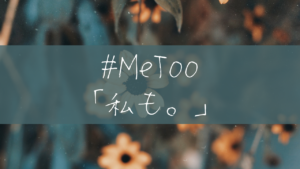Preface — Calling it quits to letting female anger be brushed aside as something “almost non- existent”.
“I thought it was counter discrimination.”
That’s what my good friend said when inspired by a certain tweet, I started the #KuToo movement.
I had tweeted -- “I want to do away with the custom of women having to wear high heels or pumps at the workplace. While a student at a vocational school, I once worked as a live-in part-timer at a hotel, but those pumps were killing me. I even had to quit the school. Why should we suffer injury at work wearing high-heeled shoes, while men wear flat shoes?”
This tweet got 30, 000 retweets and 67,000 likes. When I said this to my friend -- we were very close then -- she responded with the words with which I began the preface. I didn’t quite understand her and got very confused. I thought my words “while men wear flat-soled shoes” stuck in her craw, for I was bewildered the moment I heard her say “Men too have it hard, having to wear leather shoes”. Her argument was one I would repeatedly hear till I was deathly tired, and to which I had to repeat the same explanation a zillion times. My rejoinders to “shit replies”1 may have started with the spat I had with her.
1Kusoripu, shit replies. Disparaging replies on Twitter.
“I thought it was counter discrimination because you brought men into the argument. But we’re talking about pumps, and men have nothing to do with them.” That’s what she probably thought. The spat depressed me a lot. Later, I reflected upon it and checked the exchange we had on LINE. The exchange was one I wished I would never see again.
Labor law specialists and lawyers point out that the pumps issue might constitute gender discrimination. Mention this in a conversation and compare the practice with men wearing flat-soled shoes, and you get “counter discrimination”. Hell’s bells! How could you discuss “differences between the sexes” without referring to men? If men said “Women have no trouble taking full maternity leave. It’s unfair. We want to take paternity leave the same way you do”, would this be “counter discrimination”?
Some say I’m advocating “reverse discrimination”, which I think is a synonym for “counter discrimination”. But is there any such thing as “reverse” or “forward” in discrimination? Something’s wrong with their vocabulary here.
“It’s unfair that men work in flat shoes,” I tweeted. Then some griped: “Why spoil the good argument you have by calling down on men?” I don’t regret calling it “unfair”, because it’s unfair. Men wear flat leather shoes at work because they’re men, right? Did they make any special effort to become men? Are we female because we didn’t try hard enough? Come on. Men are men simply because they are born with male genitals. Women are women because of female genitalia. It’s as simple as that.
Then why can men wear flat shoes when women can’t, doing the same work? Is there work that women can’t do in flat shoes? I wouldn’t have become aware of this incongruity if I had worried only about my aching feet, or the injury I incurred wearing pumps. I realized this while working at a funeral parlor where I observed men working in shoes different from mine. Men were running about here and there, whereas I couldn’t run well, unstable in pumps open wide at the instep. Moreover, I was warned not to make clacking sounds as I walked when the funeral ceremony began. I was evaluated, however, in the same way men were. The criteria in the eyes of our boss and the funeral attendees were, on the positive side, “promptness”, “moving quickly and quietly to attend to all that’s happening”; on the negative side, “slow in attending to emergencies”, “makes sounds of footsteps and disturbs the quiet of the occasion”. I got a poor evaluation, for clearly I wasn’t on equal footing.
I first responded to #MeToo at the end of 2017. Since then, gender equality and feminism have occupied my mind, even in my sleep. No longer could I turn a blind eye to the disparity, whose solution you can’t arrive at without broaching “differences”. No talk of differences, no solution. At least not a fundamental one.
On a slightly different topic. I have a male friend I’ve known since before I got involved with #MeToo. We’re very close. He’s not my “partner”, but to me, he’s more than just a friend. In the early days of our relationship, he used to say things, without any ill will, that sounded a lot like “shit replies”. When I complained that his friend harassed me, that he unilaterally passed judgement on how I look, he said, “But you were having fun with the other guys”, or “Go easy on him. The dude has his share of woes in relations with other women. You need to be more understanding.” He jabbed me with many truly shit replies. In those days, I used to suppress my anger, smile and talk calmly and reservedly so as to get my ideas across to him in easy-to-understand language, not hurt his pride or make him feel bad. I get the shivers when I think back on those days. Brrrr!
Why did I do that, you ask? Well, I was just following the instructions in a how-to book on love and romance. It expounded on “male brain” versus “female function” relationships and said that women, because we’re emotional, ought to be careful in the way we express ourselves. But doing what the book told me to do didn’t stop my good friend’s “real shit replies”. The more I tried to communicate with him the way it instructed me to, the worse it got. He even stopped listening to me.
I reflected upon it, and I think I now know why. I wasn’t communicating with him on level ground. It had been imprinted in my subconscious mind that I wouldn’t be heard unless I spoke in a reserved manner. But no matter how hard I tried, he wouldn’t listen. My stress mounted to the nth degree. Then one day I decided to let the shit hit the fan.
I resolved to be angry for real. I made a conscious effort to communicate my anger to him. I did the same to others, too, to men and women alike. An impolite remark has got to be met with due anger. Until then, whenever I thought I had said a bit too much, I said to myself, “Ah, I’m being hysteric again. What a Bitch.” But then I freely went “Ahhhhhhh!” on LINE. And I stopped being regretful. Instead, I commended myself. I think I let anger get the better of me for the first time in my life. It was refreshing as hell. I told myself that, if he was still going to carry on with his “real shit replies”, then the hell with him.
But he started listening to me. He listened to the “content” of what I said. Strange, but it’s true. He began to understand the issues of feminism and gender equality. He still retorts with real shit replies, sometimes, but when I express my anger in a timely manner, he immediately listens and tries to understand. On the eve of the day I was going to submit the #KuToo petition, he helped me organize and put together my many papers.
Going through thick and thin together, I got to love him more, of course. For one thing, he began to respect me as a human being. Having lived a man’s life all along, he doesn’t understand many of the things I say, but he tries. For that, I am truly very grateful.
Through this experience, I learned to consciously become “properly angry”, that is, to call a spade a spade and not awkwardly hide what I need to say. My responses to shit replies are not meek. Because I used to be a photogravure model, I get tweets like “what’s an ex-gravure bareskin yapping about?” Earlier, I would have replied, “Yes. It’s my fault that I can’t be heard right because of the work I used to do. But there are many women who’re suffering. Could you please help?” None of that anymore. When anybody mentions “nude”, I say, “Huh? Shut your trap!”, “What’s wrong with peeling off?”
Some people give me “shit advice”2 like, “If you’re really trying to seek a solution to the pumps problem, you’d better not mention ‘gender discrimination’.” Because I want to deal with the gender discrimination issue as well, I do not shy away from using the term just because it might go against the grain of some men. I welcome objection. What’s wrong with asking for it? Noteworthy is the fact that I get flak for calling gender discrimination exactly what it is: gender discrimination.
2Kusobaisu, “shit advice”. Worthless, condescending advice.
Women here have not been allowed to express anger. When we do, we’re repressed with such words as, “You’re hysteric”, “No man would like you”, “Talk like that, and nobody will listen”. Of the many emotions we have, anger is one we are told not to display. But isn’t anger an important emotion, too? I took to heart what writer Tamaka Ogawa -- my unfailing supporter while I worked with #MeToo -- penned in her book3, and decided to rid myself of the notion of suppressing anger as something, in her words, “deemed almost non-existent”.
3Ogawa, Tamaka, “Hotondo nai” koto ni sarete iru gawa kara mita shakai no hanashi o (A tale of society as seen from the side of those regarded as almost non-existent), Taba Books, 2018
I hope you enjoy this book that tells about how I became a blazing-mad feminist after hashtagging #MeToo. It took me a while to get here. Thirty years or so. But with the surefire killer technique I’ve acquired for blowing a gasket, I am now living the happiest moment of my life. Others may call me a pitiful, perennially-angry soul. But it’s me who decides how I feel. No one else but me decides what happiness to me is. This society won’t stand up for me in anger even if I meet with sexual harassment, sexual assault, or if my dignity is damaged as a result of it. So I must get angry myself for my own good. I believe I deserve to. If there are any among my readers who feel they need to be angry (those who don’t need to be, don’t of course), I advise you to muster up some courage and go ballistic. I honestly feel great when I do. I would like you to make the choice that fills your heart with joy. That, perhaps, will not only save you, but will also lead to redeeming this society the way the #KuToo movement hopes to do. It started with my tantrum-like gripe -- “But men wear flat shoes!” -- and became a social movement now known the world over.
![石川優実 [Yumi Ishikawa] Official Site](https://ishikawayumi.jp/wp-content/uploads/2024/06/石川優実-3.png)

